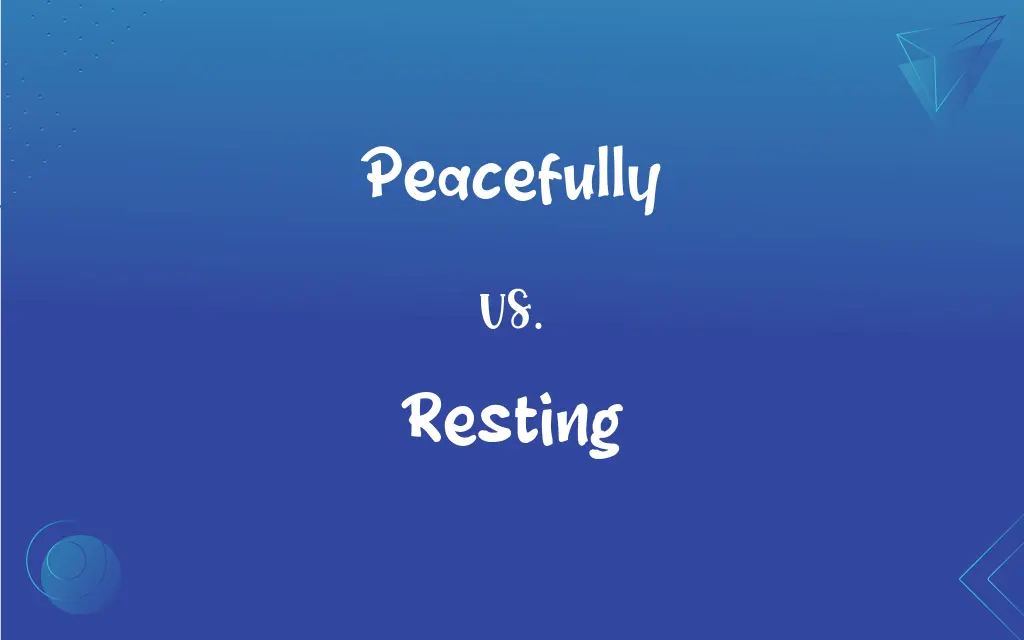Peacefully vs. Resting: What's the Difference?
Edited by Aimie Carlson || By Harlon Moss || Published on January 18, 2024
Peacefully refers to doing something in a calm and tranquil manner, while resting means taking a break or pause for relaxation or recovery.

Key Differences
Peacefully and resting are terms often used to describe states of calm, but they differ in context and application. Peacefully is an adverb describing the manner in which an action is done, implying a sense of tranquility and absence of disturbance. Resting, on the other hand, is a verb (or gerund when used as a noun) that specifically refers to the act of relaxing, taking a break, or ceasing work or movement.
When someone is peacefully engaged in an activity, it suggests they are doing it in a serene and undisturbed manner. This term is often used in a broad range of contexts, from sleeping peacefully to living peacefully. Resting, however, directly refers to the act of taking rest, which can be physical, like lying down, or mental, like taking a break from stressful activities.
The use of peacefully often connotes a deeper sense of harmony and absence of conflict. It can be used to describe not just physical states but also mental or emotional states, such as feeling peaceful. Resting is more straightforward, focusing on the physical or mental pause from activities, without necessarily implying a deeper emotional state.
Peacefully can modify various actions, suggesting that whatever is being done is carried out in a calm and gentle manner. For example, a protest can be conducted peacefully, indicating a lack of violence or disturbance. In contrast, resting is specific to the act of taking a break or pausing, like resting after a long run, emphasizing the cessation of activity for recovery or relaxation.
Peacefully and resting can both relate to states of calm and relaxation, peacefully is broader, describing the manner or quality of various actions or states, and resting is more specific, referring to the actual act of taking a break or relaxing.
ADVERTISEMENT
Comparison Chart
Part of Speech
Adverb
Verb (or gerund/noun)
Context of Use
Describes manner of action
Refers to action of taking a break
Connotation
Implies tranquility and harmony
Focuses on physical or mental pause
Application
Broad, can modify various actions
Specific to resting or relaxing
Emotional Implication
Can imply deeper sense of peace
Primarily physical or activity-based
ADVERTISEMENT
Peacefully and Resting Definitions
Peacefully
In a serene and quiet way.
He read his book peacefully by the window.
Resting
Lying down or reclining to relax.
He was resting on the couch after a long day.
Peacefully
In a tranquil and calm manner.
She slept peacefully through the night.
Resting
Ceasing motion or exertion temporarily.
The athlete was resting between training sessions.
Peacefully
Without disturbance or conflict.
The two countries coexisted peacefully.
Resting
Pausing for relaxation or recovery.
She was resting after her surgery.
Peacefully
Marked by an absence of stress or agitation.
The negotiations proceeded peacefully.
Resting
Taking time off to rejuvenate.
She is resting at home during her vacation.
Peacefully
In a way that promotes harmony.
The diverse community lived together peacefully.
Resting
Occurring during a state of inactivity
A resting pulse.
Peacefully
Undisturbed by strife, turmoil, or disagreement; tranquil
A peaceful hike through the forest.
Resting
(Biology) In a temporary phase of not growing, dividing, or being active
The resting brain.
Resting spores.
Peacefully
Inclined or disposed to peace; peaceable
A peaceful solution to the dispute.
Resting
The action of rest
Peacefully
Not involving violence or employing force
A peaceful protest.
Resting
A place where one can rest; a resting place.
Peacefully
In a peaceful manner.
Resting
A pause; a break; an interlude.
Peacefully
In a peaceful manner;
The hen settled herself on the nest most peacefully
Resting
That rests; that is not in action or in the process of growth.
Resting
(euphemism) Unemployed; out of work.
Resting
Remaining; stationary.
Resting
Present participle of rest
Resting
Taking a break from activity or work.
After the hike, they were resting under a tree.
FAQs
Is resting always physical?
No, it can refer to mental and emotional relaxation as well.
Can peacefully be used to describe physical activity?
Yes, it can describe physical activities done in a calm manner.
Can peacefully imply a lack of conflict?
Yes, it often connotes absence of conflict or disturbance.
Can peacefully be used in emotional contexts?
Yes, it can describe emotional states of tranquility.
Can peacefully be used to describe political situations?
Yes, like peaceful negotiations or coexistence.
Is resting a verb or noun?
It's primarily a verb, but can be a noun (gerund) in some contexts.
Does resting imply a temporary state?
Yes, it usually refers to a temporary pause or break.
Can peacefully describe relationships?
Yes, it can describe harmonious and conflict-free relationships.
Is resting only associated with sleep?
No, it can refer to any form of relaxation or break.
Is resting an active or passive activity?
It's generally considered a passive activity.
Does peacefully always imply a positive situation?
Generally, yes, but context can affect its interpretation.
Does peacefully imply a certain atmosphere?
Yes, it often implies a serene and undisturbed atmosphere.
Does resting always involve lying down?
No, it can involve sitting or other relaxing positions.
Is peacefully commonly used in everyday language?
Yes, it's a common adverb in various contexts.
Is resting a temporary or permanent state?
It's typically a temporary state.
Can resting refer to taking a break from mental activity?
Yes, like resting one's mind after intense concentration.
Can resting be used in a medical context?
Yes, like resting for recovery from illness or surgery.
Can peacefully describe a person's demeanor?
Yes, like someone having a peaceful demeanor.
Is resting synonymous with sleeping?
No, it's broader and includes other forms of relaxation.
Can peacefully be used in legal contexts?
Yes, such as in describing peaceful protests.
About Author
Written by
Harlon MossHarlon is a seasoned quality moderator and accomplished content writer for Difference Wiki. An alumnus of the prestigious University of California, he earned his degree in Computer Science. Leveraging his academic background, Harlon brings a meticulous and informed perspective to his work, ensuring content accuracy and excellence.
Edited by
Aimie CarlsonAimie Carlson, holding a master's degree in English literature, is a fervent English language enthusiast. She lends her writing talents to Difference Wiki, a prominent website that specializes in comparisons, offering readers insightful analyses that both captivate and inform.







































































